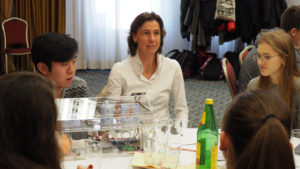 What are the future topics in research? How does the day-to-day work of a researcher look like? Judith Schwarzer recently answered these and other questions asked by curious elementary school pupils at the ‘fti…remixed Speed Dating Event’.
What are the future topics in research? How does the day-to-day work of a researcher look like? Judith Schwarzer recently answered these and other questions asked by curious elementary school pupils at the ‘fti…remixed Speed Dating Event’.
Can houses be made smart power users?
„Yes“, said Judith Schwarzer on this question and explained the technology using a smart home model. For example, electricity can be produced in a house with a solar collector on the roof. At the same time, there are numerous devices that consume electricity, like washing machines, dishwashers or electric cookers, and increasingly more electric cars in the future. Therefore, it is important to find a balance between when the solar collectors reach peak production and when to sensibly charge or use power consumption-heavy devices.
“A smart home makes such decisions supported by information technology. The data that is used for this includes not only the in-house status but also includes information about the surrounding power grid and the amount of available power”, Schwarzer explains. To efficiently use the energy, especially those generated by renewable energy sources, smart grids are required. They can coordinate the production and consumption of electricity as well as possible.
Network specialist and research expert for demand response management
Judith Schwarzer studied physics at the TU Darmstadt and physical education at the German Sport University Cologne. She has been working as an assistant professor and researcher at the ITS degree program of the FH Salzburg for several years. The expert for demand response management at the Center for Secure Energy Informatics specializes in the field of teaching in particular on wireless network technologies.
Picture by: PlanSinn Planung & Kommunikation GmbH